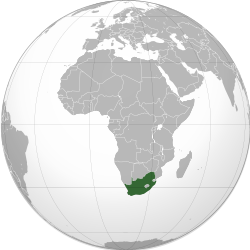Background
History
Numbers were allocated when South Africa had only four provinces, meaning that ranges are now split across the current nine provinces.
Namibia
South-West Africa (including Walvis Bay) was integrated into the South African numbering plan. [1] However, the International Telecommunication Union (ITU) had already allocated country code 264 in the late 1960s. [2]
Following its independence, Namibia discontinued direct dialing from South Africa and replaced it with international dialing using country code 264. For example, for a call from South Africa to Windhoek, before and after 1992:
- Before 1992: 061 xxx xxxx
- After 1992: 09 26461 xxx xxxx [3]
- After January 2007: 00 26461 xxx xxxx [4]
Lesotho
Calls to Lesotho could be made using the access code 050 instead of the international code 266; for example, to call Maseru from South Africa, subscribers would dial 0501. [5]
Number ranges
01
The old Transvaal province, currently comprising Gauteng, Mpumalanga, Limpopo and part of the North West:
- 010: New overlay plan for Johannesburg
- 011: Witwatersrand region around Johannesburg, currently code for the entirety of Greater Johannesburg
- 012: Pretoria and surrounding towns (also includes Brits)
- 013: Eastern Gauteng (Bronkhorstspruit) and Western and northern Mpumalanga: Middelburg, Witbank and Nelspruit
- 014: Northern North West and Southwestern Limpopo: Rustenburg and Modimolle
- 015: Northern and Eastern Limpopo: Polokwane
- 016: Vaal Triangle: Vereeniging, Vanderbijlpark and Sasolburg, which constitutes an anomaly, since Sasolburg isn't the old Transvaal.
- 017: Southern Mpumalanga: Ermelo
- 018: Southern North West: Mahikeng, Lichtenburg, Potchefstroom and Klerksdorp
06 (Cellular)
Cellular [7]
- 0600: Cellular: Used by Liquid Telecommunications (South Africa)
- 0601 - 0602: Cellular: Used by TelkomSA (8.ta)
- 0603 - 0605: Cellular: Used by MTN
- 0606 - 0609: Cellular: Used by Vodacom
- 061: Cellular: Used by Cell C
- 062: Cellular: Used by Cell C
- 0630 - 0635: Cellular: Used by MTN
- 0636 - 0637: Cellular: Used by Vodacom
- 0640: Cellular: Used by MTN
- 0641 - 0645: Cellular: Used by Cell C
- 0646 - 0649: Cellular: Used by Vodacom
- 0650 - 0654: Cellular: Used by Cell C
- 0655 - 0657: Cellular: Used by MTN
- 0658 - 0659: Cellular: Used by TelkomSA (8.ta)
- 066: Cellular: Used by Vodacom
- 0670 - 0672: Cellular: Used by TelkomSA [8]
- 0673 - 0675: Cellular: Used by Vodacom
- 0676 - 0679: Cellular: Used by TelkomSA (8.ta)
- 0680 - 0685: Cellular: Used by TelkomSA (8.ta)
- 0686 - 0689: Cellular: Used by MTN
- 0690: Cellular: Used by MTN
- 0691 - 0699: Cellular: Used by TelkomSA (8.ta)
07 (Cellular)
- 0710: Cellular: Used by MTN
- 0711 - 0716: Cellular: Used by Vodacom
- 0717 - 0719: Cellular: Used by MTN
- 072: Cellular: Used by Vodacom
- 073: Cellular: Used by MTN
- 074: Cellular: Used by Cell C
- 0741: Cellular: Used by: Virgin Mobile as of June 2006 to September 2021 [9]
- 076: Cellular: Used by Vodacom
- 0771 - 0775: Cellular: Used by Vodacom
- 078: Cellular: Used by MTN
- 079: Cellular: Used by Vodacom
08
Cellular
- 0810: Cellular: Used by MTN
- 0811 - 0815: Cellular: Used by TelkomSA (8.ta)
- 0816: Cellular: Used by Rain
- 0817: Cellular: Used by TelkomSA (8.ta)
- 0818: Cellular: Used by Vodacom
- 0819: Cellular: Used by TelkomSA (8.ta)
- 082: Cellular: Used by Vodacom
- 083: Cellular: Used by MTN
- 084: Cellular: Used by Cell C
Special Services
- 080: FreeCall, Toll-free, called party pays
- 085: Cellular: USAL license holders - Vodacom and MTN have some prefixes out of this range for their USAL offerings
- 086: Sharecall, MaxiCall and premium-rate services, calls can be routed to regional offices automatically
- 0860: Sharecall Land line callers pay local call, called party pays long distance if applicable
- 0861: MaxiCall caller always pay long distance for call even if routed to local office
- 0862 - 9: Premium rate caller pays increasing rate linked to last digit [10]
- 0862, 0865, 0866, 08673, 08774, 08676: Fax to Email caller always pay increasing rate linked to last digits
- 08622, 086294: Competition lines caller always pay premium rate
- 08671 - 08674: Information services caller always pay increasing rate linked to last digit
- 087: Value-added services (VoIP among others)
- 088: Fax Divert, Pagers and Telkom CallAnswer voicemail
- 089: Maxinet, for polls and radio call-in services
Note that from 10 November 2006, mobile number portability was introduced in the cellular market. The cellular prefixes as above are therefore not strictly applicable anymore, although they remain mostly unchanged.
- 090: Premium-rate services [7] [11]
- 0902: Premium-rated adult services [12] [7]
- 091: Premium-rate services
- 092: Premium-rate services
- 096: Machine-related services (14-digit numbers)
- 097: Machine-related services (14-digit numbers)
- 098: Machine-related services (14-digit numbers)
There are still some non-automated exchanges which use longer dialing codes, mostly for "farm lines" and remote areas with operator-assisted exchanges.
09X XXX XXXX numbers are no longer in use in South Africa.
This page is based on this
Wikipedia article Text is available under the
CC BY-SA 4.0 license; additional terms may apply.
Images, videos and audio are available under their respective licenses.
